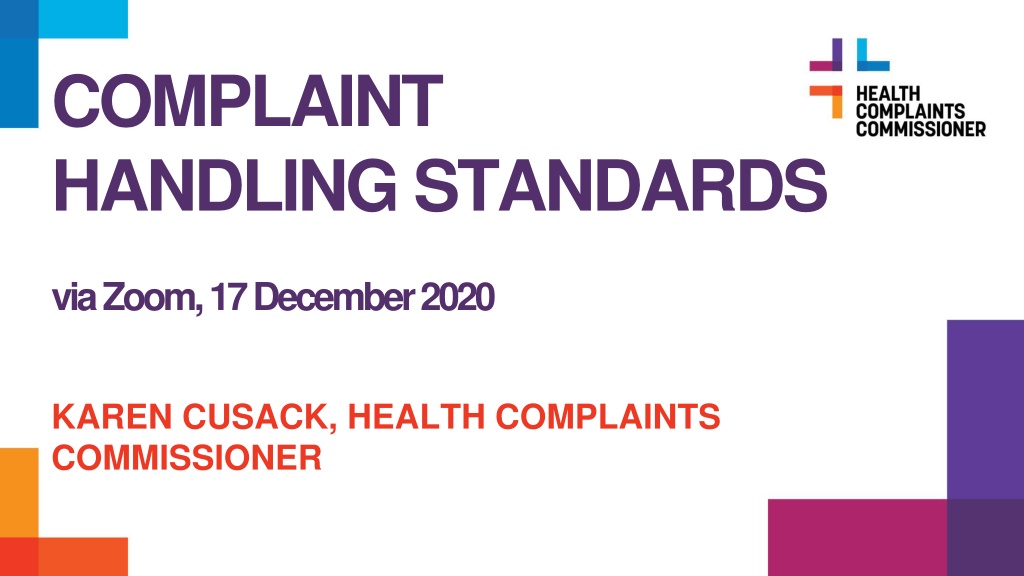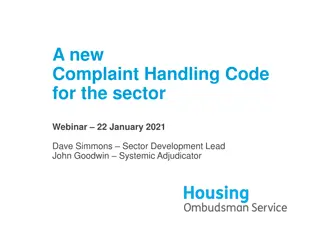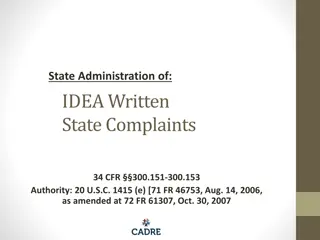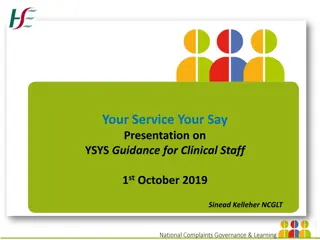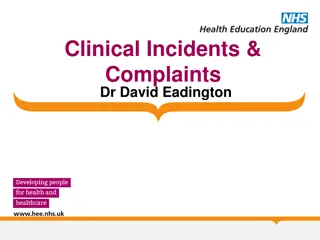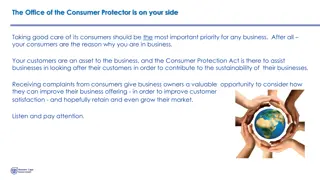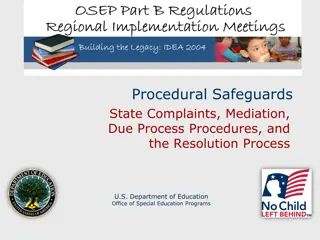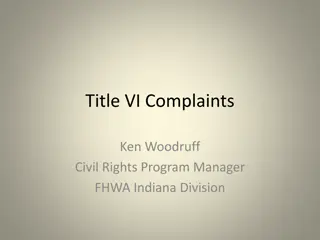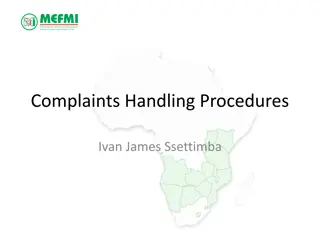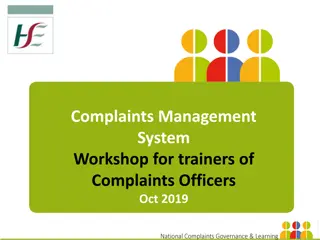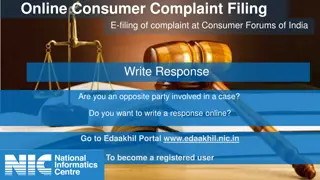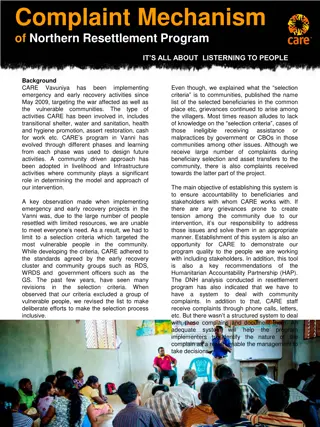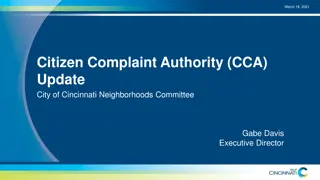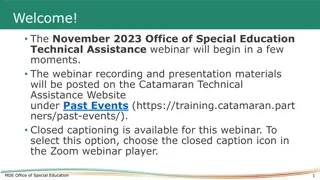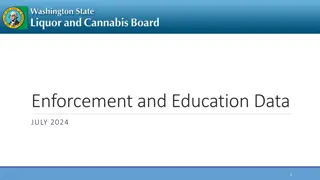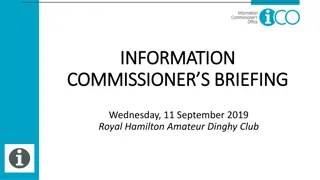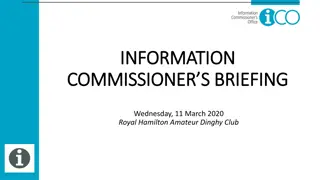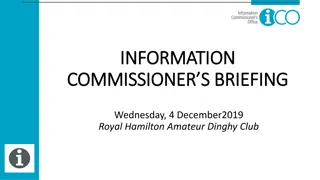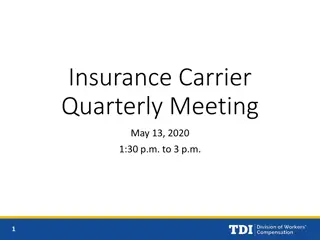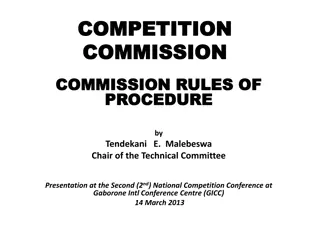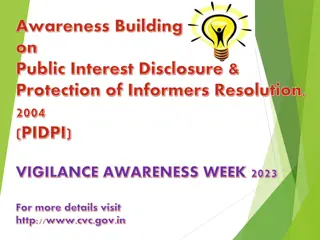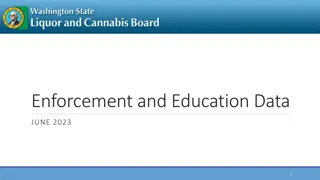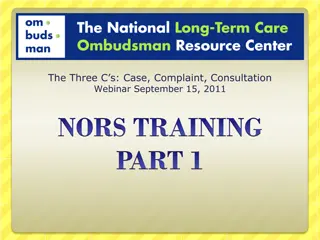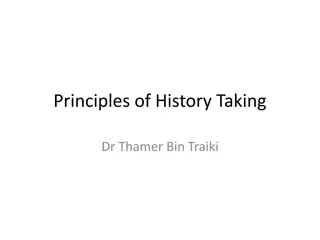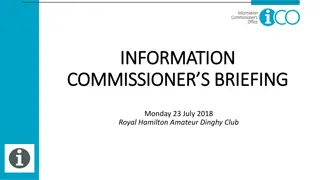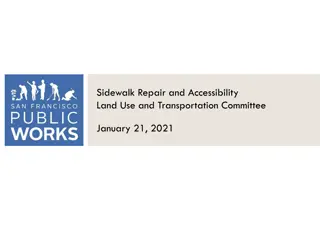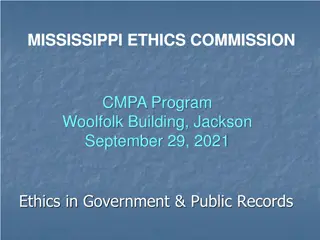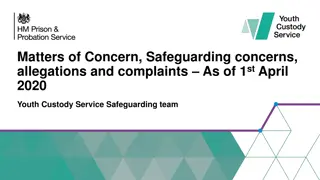Effective Complaint Handling Standards in Healthcare: A Guide by the Health Complaints Commissioner
Learn about the Health Complaints Commissioner's role in resolving issues in healthcare services, handling complaints, and improving quality standards. Discover the benefits of good complaint handling, including building trust, promoting quality improvement, and enhancing communication. Explore common issues addressed by the HCC, and understand the importance of proper communication and feedback in healthcare settings.
Download Presentation

Please find below an Image/Link to download the presentation.
The content on the website is provided AS IS for your information and personal use only. It may not be sold, licensed, or shared on other websites without obtaining consent from the author. Download presentation by click this link. If you encounter any issues during the download, it is possible that the publisher has removed the file from their server.
E N D
Presentation Transcript
COMPLAINT HANDLING STANDARDS viaZoom, 17 December 2020 KAREN CUSACK, HEALTH COMPLAINTS COMMISSIONER
INTRODUCTION OVERVIEW OF THE HCC 1 February 2017 Health Complaints Act 2016 Health Complaints Commissioner Powers and responsibilities include: complaints resolution development of complaint handling standards investigations
INTRODUCTION OVERVIEW OF THE HCC What we do We: resolve complaints provision of health services handling of health information are independent and impartial can accept complaints from anyone, including third parties review complaints data to identify trends and suggest quality improvements can investigate where a serious risk to the public
INTRODUCTION OVERVIEW OF THE HCC Issues we commonly see include: unsatisfactory treatment unprofessional behaviour poor communication about treatment, options, costs admission or referral problems lack of respect or privacy mishandled health information
BENEFITS OF GOOD COMPLAINT HANDLING Complaints: are inevitable everyone has a right to make a complaint are not bad no blame, support for staff, build trust are an important part of quality improvement can be useful if a genuine interest in feedback for improvement give consumers a voice
BENEFITS OF GOOD COMPLAINT HANDLING Good communication How to say sorry... properly Recognise the mistake and the harm it caused no "template" phrases Take responsibility and acknowledge what occurred Express regret or sympathy Reason for what happened What is being done to fix it
BENEFITS OF GOOD COMPLAINT HANDLING Builds a culture of feedback, continuous quality improvement and risk management in healthcare providers Reduces the number of issues that become formal complaints Identifies systemic issues Builds the capacity of healthcare providers to handle complaints internally Promotes safe and quality care
COMPLAINT HANDLING STANDARDS Legislative basis Health Complaints Act 2016 132 Standards for complaint handling (1) The Commissioner must prepare a document that sets out the standards to be met by health service providers in handling complaints in respect of the following matters (a) the provision of information regarding the making of complaints in an accessible form; (b) the acknowledgement of complaints in a prompt manner; (c) the requirements to resolve complaints promptly; (d) keeping each complainant informed about the handling of a relevant complaint; (e) advising each complainant of the outcome of the relevant complaint;
COMPLAINT HANDLING STANDARDS Legislative basis Health Complaints Act 2016 132 Standards for complaint handling - contd (1) (f) keeping personal information confidential; (g) keeping records of all complaints, complaint handling and outcomes; (h) any other matter for or with respect to the handling of complaints by health service providers. Schedule 1 interim standards
COMPLAINT HANDLING STANDARDS Consultation 2018 discussion paper widespread input health services, consumers, other stakeholders
COMPLAINT HANDLING STANDARDS Legislative basis Health Complaints Act 2016 133 Making of standards (1) The Commissioner must give the document prepared under section 132 to the Minister. (2) On the recommendation of the Minister, the Governor in Council, by order published in the Government Gazette, may make standards for or with respect to the matters set out in section 132 (1).
WHAT THE STANDARDS COVER Summary of s.132(1), standards in respect of the following matters: Accessibility Prompt acknowledgement Ongoing communication Prompt resolution Outcomes Confidentiality Record-keeping Other matters
COMPLAINT HANDLING STANDARDS - PROCESS Lodging the complaint Acknowledging the complaint Ongoing communication Prompt resolution Finalising the outcome
WHAT THE STANDARDS COVER Standard 1: The health service provider fosters an open and receptive culture to feedback and complaints that leads to continuous improvement of the quality of their health service Standard 2: All reasonable steps are taken to support a person to make a complaint about a health service provided to, or sought by, a person, or an offer of a health service to a person Standard 3: No person shall experience reprisals because of providing feedback or making a complaint to a health service provider. Other matters s.132(1)(h)
WHAT THE STANDARDS COVER Standard 4: The complaint is acknowledged by the health service provider to the complainant as soon as practicable or within three working days. Where applicable, the complaint is remedied at the time it is made. Prompt acknowledgement s.132(1)(b) Standard 5: The complainant and the health service provider must mutually agree on a method and frequency of communication throughout the complaint handling process Ongoing communication s.132(1)(d)
WHAT THE STANDARDS COVER Standard 6: The health service provider aims to give the complainant a clear and timely response to the complaint within 30 working days of receiving it. Where this cannot be achieved the reason for this and the expected timeframe for responding to the complaint is communicated to the complainant as soon as possible. Prompt resolution s.132(1)(c) and outcomes s.132(1)(e) Standard 7: A response to the complainant includes information about how to make a complaint to the Health Complaints Commissioner Accessibility s.132(1)(a)
WHAT THE STANDARDS COVER Standard 8: The personal information, collected from a complaint, must be kept confidential in accordance with the Health Records Act 2001, the Privacy and Data Protection Act 2014, the Privacy Act 1988 (Cth), the My Health Records Act 2012 (Cth) and, where applicable, the Health Services Act 1988 Confidentiality s.132(1)(f) Standard 9: Records of complaint handling must be kept separate from a person s health information Record-keeping s.132(1)(g)
WHAT THE STANDARDS COVER Standard 10: Where possible, the staff dealing with a complaint must identify, declare and manage any conflicts of interest when handling the complaint. Standard 11: The health service provider s complaint records form part of continuous quality improvement and must be managed in accordance with all relevant legislation and regulations and policies issued with respect to complaint records as amended from time to time, including these Complaint Handling Standards. Other matters s.132(1)(h)
SUMMARY Complaints: as feedback give consumers a voice highlight quality improvement opportunities Processes for dealing with complaints complaint handling standards everyone knows the standards and the processes Data and information derived from complaints integrated into all areas of continuous improvement
RESOURCES HCC website - www.hcc.vic.gov.au Information on: what we do; legislation under which we operate; training and education sessions; and resources for the public and health service providers.
ANY QUESTIONS? Health Complaints Commissioner hcc.vic.gov.au 1300 582 113
